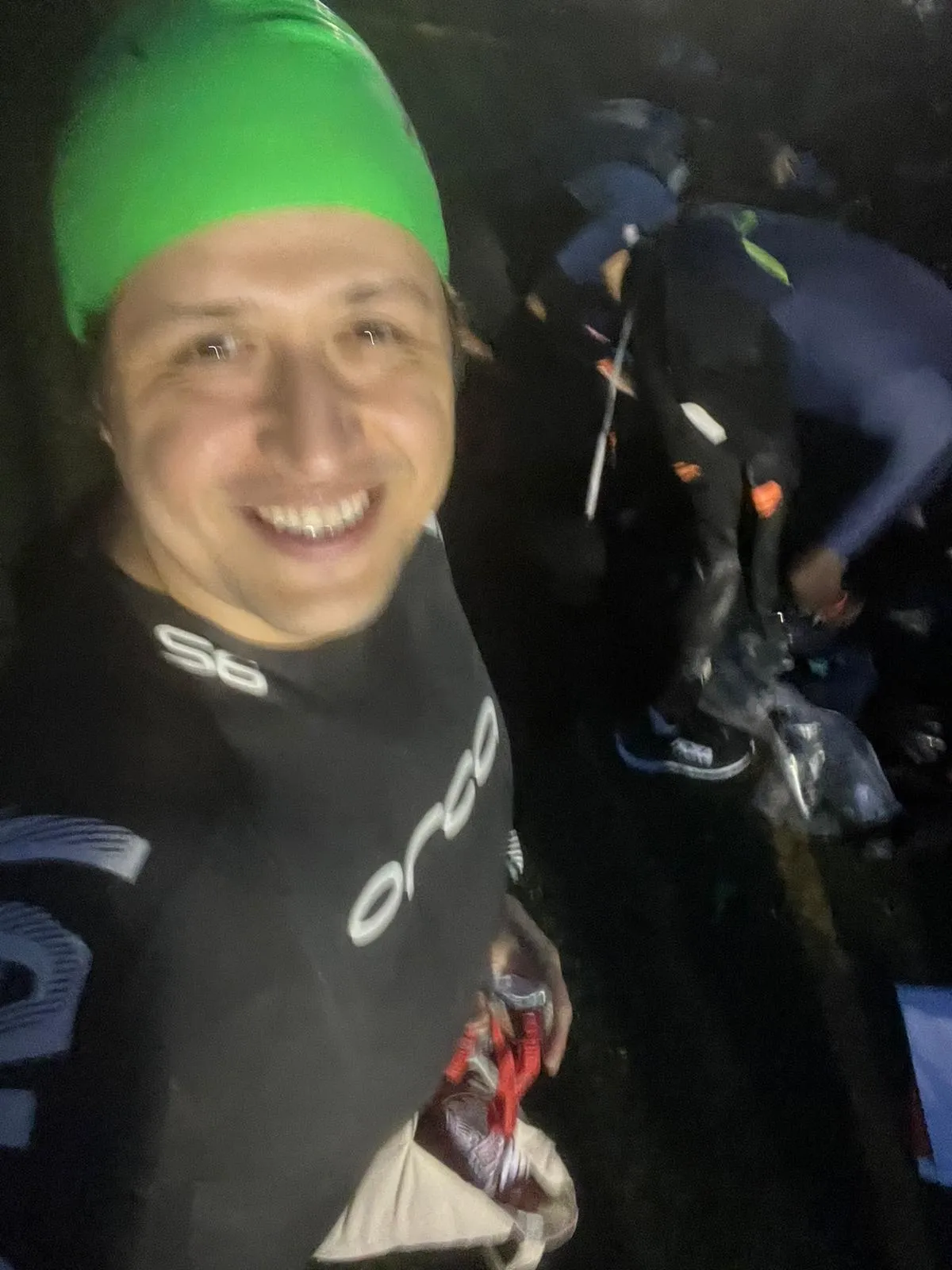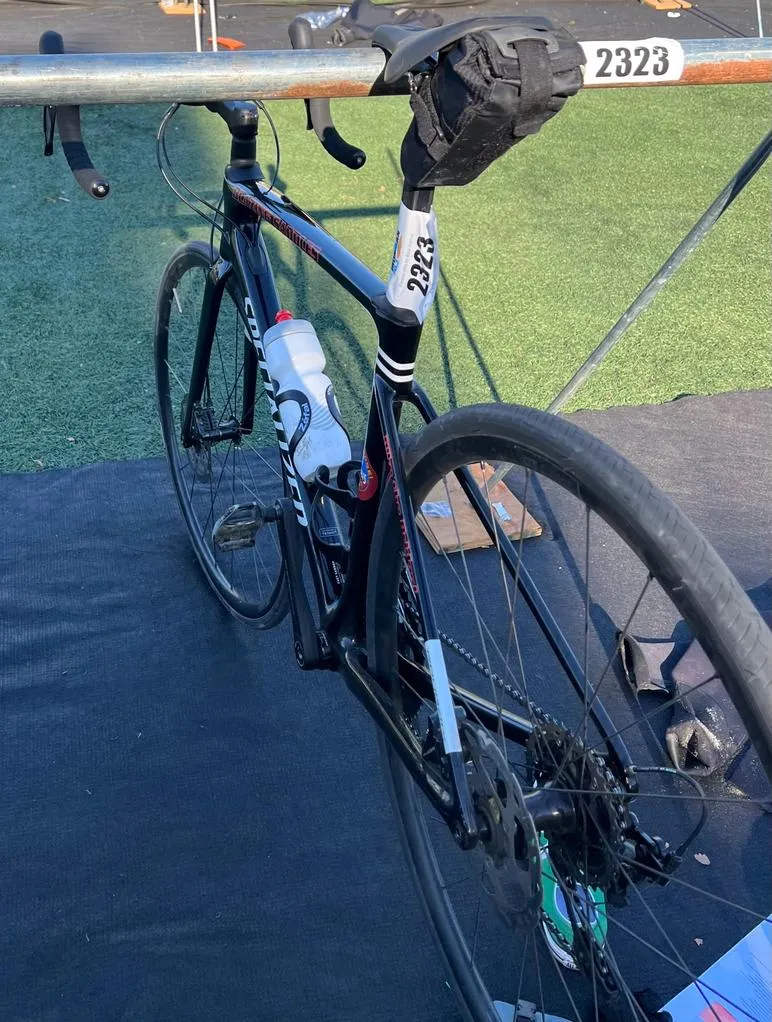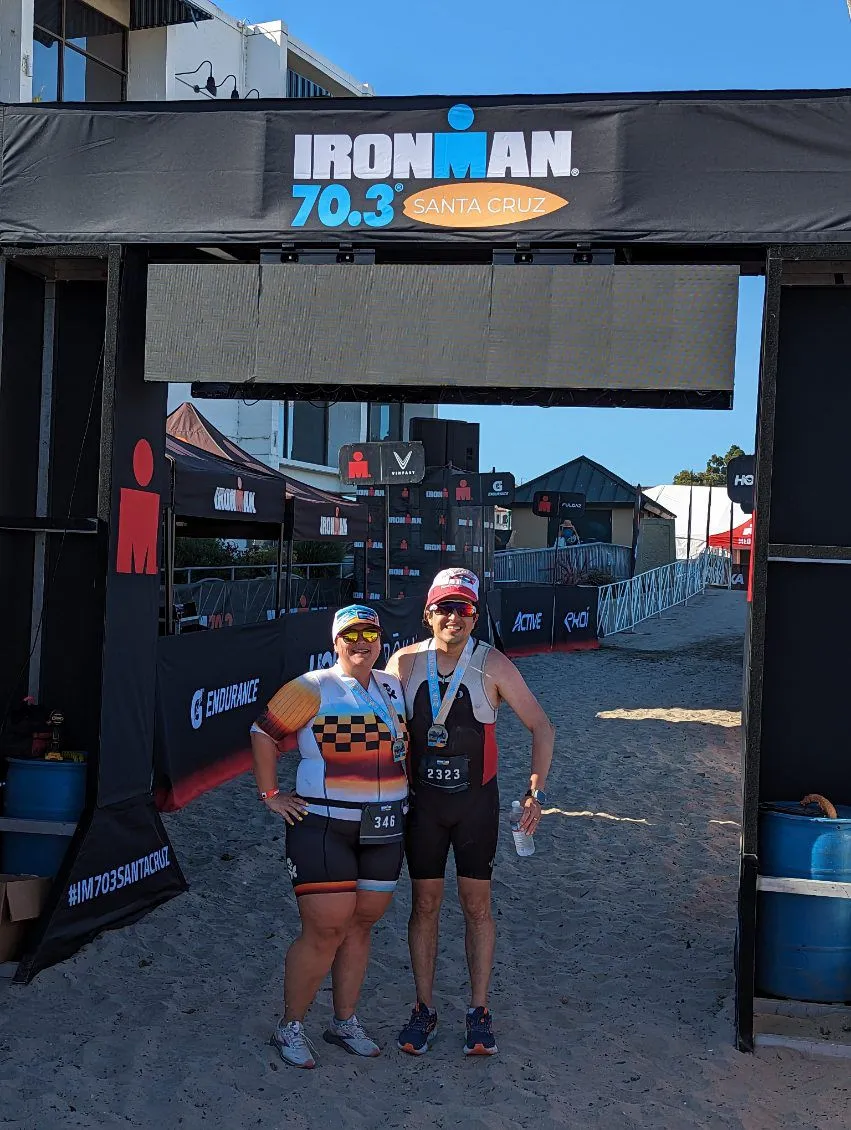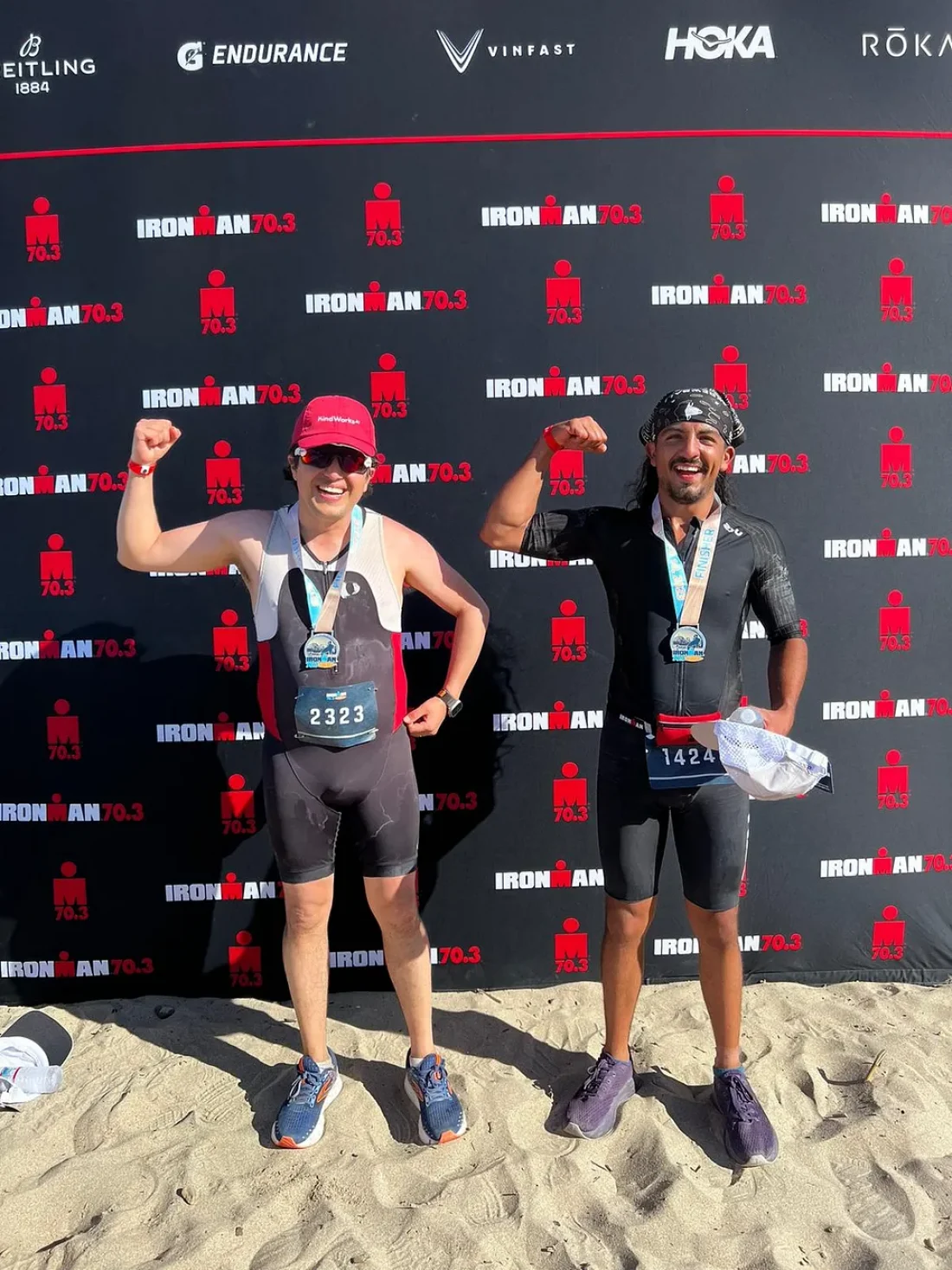In the spring of 2022, I signed up for a Half Ironman triathlon, assuming that I could balance my role as CEO of a fast-growing startup, KindWorks, with the necessary training. At that time, the idea of completing a half-ironman, especially for someone who was out of shape during and after a pandemic, felt like an impossible challenge but one that I wanted to undertake. I believed that I could manage my time and commit to triathlon training without any major risks.
A Half Ironman triathlon is quite an endeavor, involving a 1.9-kilometer (1.2-mile) swim in under 1.2 hours, a challenging 90-kilometer (56-mile) bike ride, often on hilly terrain, and a 21-kilometer (13.1-mile) run, which is essentially a half marathon on its own. Initially, I was optimistic about achieving a work-life alignment that would allow for training. I didn’t anticipate that my work would require me to be on a hectic travel schedule for eight months out of the year. My schedule made it extremely challenging to maintain consistent triathlon training.
As I approached the race which was scheduled for September 2023 in Santa Cruz, the summer unfortunately brought more wildfires than expected in Vancouver, leading to air quality issues. That, added to increased work commitments and frequent business trips, left me severely undertrained. Just one week before the triathlon, many of my friends suggested that I consider withdrawing from the event, register for next year’s race, and plan more effectively. However, deep down, I’m someone who never gives up, regardless of the challenges I face.
On the day of the race, I carefully packed my bicycle into the vehicle I had rented, ensuring I had everything I needed. With minimal sleep and feeling underprepared, I couldn’t help but worry about what lay ahead and whether I would be able to complete the race.
During the long drive to the race, I listened to an episode of the “On Kindness” Podcast that our company recently launched. It was reiterated to me that practicing Kindness is one of the most potent tools humans have to enhance their brain, body, and performance. Every act of Kindness triggers a chemical reaction in the body that boosts overall well-being. With this in mind, I pondered whether I could apply the same principles of Kindness encouraged by our KindWorks.AI platform during my triathlon.
I made a conscious decision to intentionally and sincerely practice Kindness towards those around me and myself throughout the race. It was an experiment that couldn’t hurt and could only help my race outcome. We know that Kindness enhances performance and well-being so maybe it would help me in my triathlon performance.
I arrived at the venue, retrieved my bike, and proceeded to the transition area. There was a long line, and the race was set to begin at 9 AM. While waiting in line, I decided to start practicing Kindness.
I started by smiling at my fellow participants and offering words of encouragement. I told them, “You’ve got this, you will do fantastic in this race.” To my surprise, one friendly neighbor reciprocated with words of encouragement and even shared a caffeine gel with me, a gift that would be very helpful during the swim.
Stage 1 — The swim (1.9 KM)

Finally, at 9:45 AM, it was my turn, and the announcer declared, “There is no way back; the only way out is to get into the water.” It was time to face this challenge.
The first five minutes were pure panic as the sea water was ice-cold, and I hadn’t swam in more than 3 months. I saw my fellow swimmers racing ahead, and doubts crept in. I even considered swimming back to the shore and feared cramps. At that moment, I showed Kindness to myself. I forgave myself for not training enough, recognized my swimming technique as a strength, and believed that I could control my pace to finish the swim within the cutoff time (1 hour and 20 minutes).
After 10 minutes, I found my rhythm and focused on maintaining my pace. My goal was simple: finish the swim without cramps and within the cutoff time. As the race progressed, some of the faster swimmers who had overtaken me had to take breaks, and I eventually found myself ahead of them in the final strokes. I broke down the challenge of swimming over a kilometer into smaller milestones, telling myself, “I can do this, and nothing will stop me.”
At the halfway mark, I took the gel from under my wetsuit for a quick nutrition and energy boost which I desperately needed. Beyond the halfway point, I maintained my mental strength, knowing that I could make it to the finish line. I spotted the shore and completed the swim in under an hour, comfortably making the cutoff time and proceeding to the next stage.
My legs felt a bit tired from the swim, but as I jogged to the transition zone, I loosened up and felt optimistic about the next challenge.
Kindness exercises toward myself got me through the swim. I practiced exercises like:
- Be Kind to yourself; take a moment to forgive yourself for a mistake you’ve made.
- Recognize your strengths and apply them immediately.
- Avoid comparing yourself to others and focus on achievable goals.
- Repeat a positive thought about yourself for more than 5 minutes.
Stage 2 — The Bike Ride (90 KM)

As I entered the transition zone, I realized I had packed the wrong tools for my bike, leading to a delay of 10 minutes while I repacked and installed the correct equipment. However, I knew the alternative was risking a flat tire that could jeopardize my entire race. So, with unwavering determination, I pressed on, accepting that I might lose some precious minutes (which, as it turned out, would later pose a significant challenge).
My approach remained consistent: my goal was to complete the race without injury and to savor the experience rather than focus on my finishing time. What made this leg of the race even better was the ability to monitor my pace using my smartwatch, which allowed me to maintain a heart rate between 120 to 140 bpm, corresponding to zone 1 — the lightest exercise intensity. With a daunting 90 kilometers ahead of me, I knew this part would be much more demanding than the swim.
Inevitably, many fellow participants surged ahead of me in the initial kilometers, a common trait among amateur triathletes who often exceed their limits in the first 20 minutes. Amidst this rush, I kept my composure, staying focused on my ultimate goal.
As I encountered steep hills, those who had previously overtaken me began to lose steam and fall behind. This was the moment I initiated my second wave of Kindness, offering encouragement to those around me. I uttered the familiar phrases like “you’ve got this” and “you can do this.” In one particular instance, a person was shouting in desperation, and I told her, “I believe in you, I know you can do this.” In an awe-inspiring change of pace she stopped shouting and replied, “I believe in you too,” before accelerating.
Despite my efforts, it wasn’t easy. My energy levels were dwindling, and I hadn’t even covered 10 kilometers. All I had eaten so far that day was the one energy gel, and the next nutrition station, manned by selfless volunteers offering bananas, Gatorade, water, and various gels, was still a considerable distance away.
The challenge was compounded by headwinds and hilly terrain, but I persisted. Every couple of minutes, I offered words of encouragement to those passing me, saying things like “well done, you’re maintaining a great pace” and “keep it up.”
Finally reaching the first hydration/nutrition station, I secured a bottle of Gatorade and a banana without stopping. The moment I took the first bite and sip, my body responded positively to the much-needed nutrition. However, I missed grabbing any gels at the station. I didn’t panic but instead shifted to a moment of appreciation. I was grateful for the nutrition that my body needed and to the volunteers for their generosity and encouragement.
With my focus on hydration and food, I pressed on despite the challenging headwinds and hilly terrain. I adhered to my pacing strategy, avoiding overexertion against the relentless wind. The journey was long, and the absence of gels in my pockets continued to concern me. Nonetheless, I persisted in encouraging others and appreciating the foodstuff I had, keeping my mindset positive as I surpassed the halfway point.
As I made a 180-degree turn, the wind was finally at my back, and some downhill sections provided respite. I maintained my zone 1 pace and regularly performed gentle calf stretches by standing on the bike. After biking 45 kilometers without consecutive training, my muscles were feeling the strain. Additionally, I was beginning to feel the discomfort of needing a restroom break, with the facilities still miles away at the next hydration stop. Nevertheless, I was determined to complete the bike ride.
The moment of truth arrived when a fellow cyclist passed me, and after I complimented his pace with “good job, keep it up,” he responded, “yes, I’m accelerating because the cutoff time is approaching.” It was a realization that I had entirely overlooked the cutoff time for the cycling stage. In fact, when I reached the bathroom station, one of the race organizers kindly informed me that we were nearing the cutoff time and that unless I summoned my best effort, I wouldn’t make it. I grabbed four gels and food and committed to myself to give my best effort.
With the new hydration and energy, I accelerated and caught up with the new friend who had warned me. I was blazing, deeply focused, and determined to build speed on the downhill to gather momentum for the upcoming ascent. While signs along the route were reminding us of the impending cutoff time, we persevered.
And then it happened — we completed the cycling leg, undoubtedly the most significant challenge of the entire triathlon for me. Yet, it wasn’t a done deal. I was exhausted, my muscles pushed to their limits, and running, which had the most impact on the body, awaited.
Practicing Kindness through gratitude, connecting, and forgiveness got me through the bike ride. I practiced exercises like:
- Uplift those around you with positive words, wholeheartedly believing in every word you say.
- Foster hope about positive things that lie ahead while facing challenges.
- When a hurdle lies before you, acknowledge it and take actions that motivate you.
- Recognize the silver linings in challenging situations.
- Express gratitude for life’s simple blessings like a meal or a drink.
- Kindness to yourself begins with taking care of your body. Prioritize your personal health.
Stage 3 — The running (21 KM / a Half-Marathon)
The final stage of the triathlon presented a unique set of challenges, as my muscles had been tirelessly engaged for hours, pushed to the brink of exhaustion. The looming threat of cramps and injuries added to the intensity of the run.
Early in the run, I crossed paths with my friend from the bike leg, the one who had warned the cutoff time. I expressed my gratitude, saying, “Thank you for inspiring me; you gave me hope.”
Throughout the run, my friend and I took turns leading, but he began to struggle with cramps. We ran together for 3–5 kilometers, during which he attempted to alleviate his discomfort through stretching. Eventually, he decided to slow down and urged me to continue, saying, “You go ahead and finish the race; I need to manage these cramps and hopefully meet you at the finish line.” I offered to stay and run together, but he insisted otherwise. I left him with encouraging words, “I’m rooting for you, and I hold the hope of seeing you at the finish line.”
One of the most uplifting aspects of the triathlon was the incredible energy radiating from volunteers and the Santa Cruz community, who passionately supported the athletes. People cheered, played music, rang bells, and shared messages of optimism like “you’ve got this” and “this is what sets you apart from the rest.” These individuals exemplified Kindness. I made it a point to express my gratitude to every person who cheered me on, letting them know how much it meant to me.
At every hydration station, I thanked the volunteers I interacted with. Despite the pain in my knees and the need to slow down, I maintained my mental focus on the goal of finishing.
As the run took me deeper into the forest, I found myself in isolated stretches. The fear of cramps or not being physically capable of reaching the finish line weighed on my mind. However, in the distance, I noticed a person struggling to walk. I approached and said, “Thank you for inspiring me and giving me hope.” A smile crossed her face, and she started jogging alongside me. I encouraged her, saying, “You can do it; we’ll finish together and take a photo at the end.” The person introduced herself as Alex, smiled, and urged me to continue at my pace, assuring me we would meet at the finish line.
I continued through a picturesque beach reserve, at times finding myself alone. I felt the exhaustion in my muscles and the challenge of covering the remaining 10 kilometers. Nevertheless, the small, simple acts of Kindness I had experienced during the race kept me going. With just 5 kilometers left, I returned to the beautiful Santa Cruz bay, continuously thanking every volunteer to gather the energy to endure. I knew that, with determination and the right pace, I could make it.
The last kilometer proved to be the most challenging. My energy was depleted, and my stomach was empty. Still, my mind was fueled by the power of Kindness, and I refused to give up. I wanted to demonstrate that Kindness prevails even in the face of some of the toughest conditions, including undertraining, strong winds, and sleep deprivation. I summoned my remaining strength.
Finally, I crossed the finish line, a moment of pure magic. One of my newfound friends stood beside me. We received our medals and celebrated together. I anxiously waited for another ten minutes, concerned that Alex hadn’t made it, although I had never witnessed such determination in anyone before.
I began to make my way out of the recovery zone, heading toward the transition area. Suddenly, I heard voices filled with excitement. There was Alex; she made it! She rushed over, hugged me, and thanked me, saying she couldn’t have done it without my support. It was a moment of sheer determination that I will never forget, another proof of the profound impact Kindness has during challenging situations.
Sharing Kindness towards others and with others got me through the run. I practiced exercises like:
- Thank someone and let them know when they have given you hope or inspired you.
- Offer encouragement to someone going through a tough time.
- Verbally express appreciation to those who support you in any way.
- Celebrate with others when you achieve your goals.

Learning and moving forward
In retrospect, I do not recommend following my training plan. I strongly encourage everyone to approach a triathlon with thorough training and comprehensive planning. I wholeheartedly recommend reading Joe Friel’s “Triathlete’s Bible,” a gift from my friend Pier Tarantelli.
No matter how much you train, a triathlon is still hard both on the body and mind. My experiment of introducing the intentional practice of Kindness into the race worked for me. I’m confident that it will work for you in any race or other challenge you are facing. My Kindness exercises during the race allowed me to not only complete the race but to feel extra accomplished and to bring others along with me over the finishline. It felt great!
Looking ahead to the next year, I have set time goals, and with the combination of training and the power of Kindness, I feel unstoppable.
Training alone is difficult, if not impossible for many people. Joining a group can improve commitment, consistency, and technique. We have initiated a new remote triathlon group called KTY Triathlon (Kindness To Yourself Triathlon Group). Sign up for the Santa Cruz Iron-Man 2024 and join our group! (link here)
I had seen the power of Kindness at the workplace through KindWorks. I now have an even stronger belief in the power of Kindness to transform every aspect of our lives and our society. The more you practice Kindness, the better you feel, and the more you can elevate yourself and those around you, transforming the entire environment.

